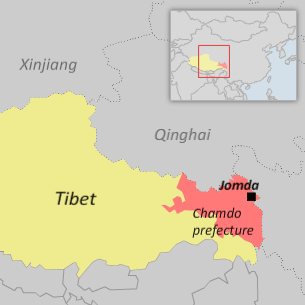
(TibetanReview.net, Oct26, 2014) – In a move to further tighten control over the local Tibetans, the Chinese authorities in Jomda (Chinese: Jiangda) County of Chamdo (Changdu) Prefecture, Tibet Autonomous Region, have ordered all residents to bring back home their families members enrolled as monks and nuns in monasteries in western Chinese provinces, reported Radio Free Asia (Washington) Oct 24. Those who fail to do so face a range of punishments, including the withdrawal of all forms of government aid.
The order was reported to have been issued in meetings held across the county in early October, reflecting a similar move previously made in neighbouring Driru (Biru) County of Nagchu (Naqu) Prefecture. The move is said to be designed to control both the movement of monks and nuns and to control the size of monasteries seen as resisting Chinese rule. This refers to Buddhist institutes in Qinghai and Sichuan provinces, especially the Larung Gar in Serta (Seda) County and Yachen Gar in Palyul (Baiyu) County, both in Kardze (Ganzi) Prefecture of Sichuan Province.
Government officials have been cited as saying the order and the threatened punishments had come from Beijing and therefore must be obeyed forthwith.
The punishment for the monks and nuns failing to return home include having their names removed from the county’s family registration lists, the invalidation of their state-issued identification cards, and the withdrawal of whatever government assistance in cash or kind their families may be entitled to.
However, prospects for the returned monks and nuns being able to join religious centres in Jomda itself is said to be bleak, given the official ceilings on their numbers and the procedural bottlenecks for enrolment. Indeed, it was due to the difficulty of being able to pursue religious education in Jomda that the monks and nuns had travelled outside to pursue their religious education. For example, in Jan 2012, the study center at Boyak Monastery in Jomda was ordered closed, driving its monks and nuns to travel to Qinghai and Sichuan to continue their religious education.


